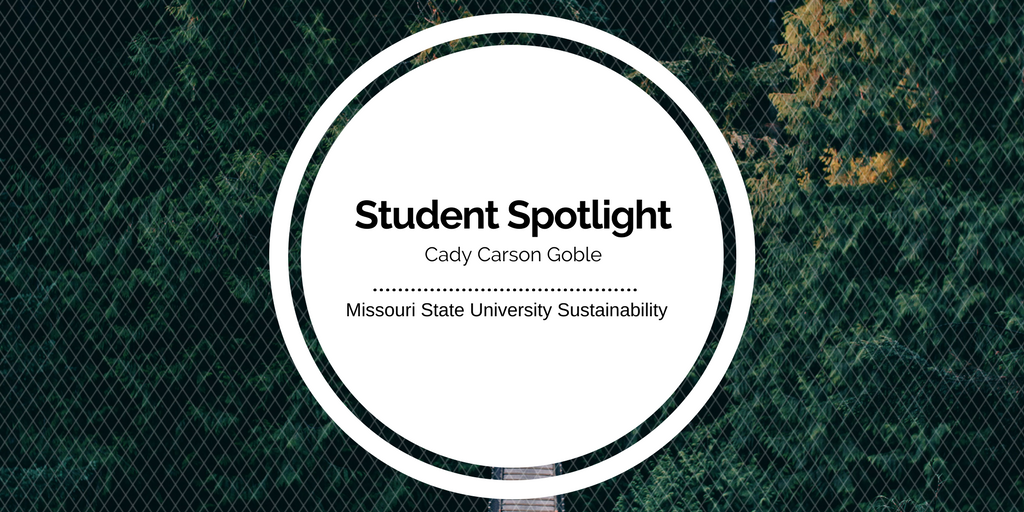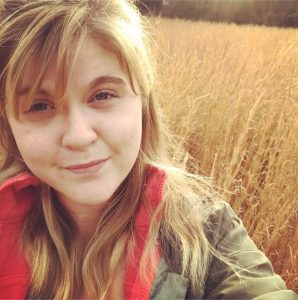This week’s Student Spotlight features Missouri State University senior, Cady Goble. Students featured in the Student Spotlights show characteristics exemplified in each of Missouri State University’s three pillars: Ethical Leadership, Cultural Competence, and Community Engagement. They also exemplify what daily practices of sustainability look like. You can find these students educating, volunteering, and pushing for a more sustainable future. Please read on to see how Cady practices the three pillars, sustainability, and what it means to be a bear.
Name: Cady Goble
Hometown: Mountain Home, Arkansas
Graduation Year: 2018
Major: Masters of Science – Plant Science
What is your favorite vegetable?
It’s difficult for me to pick a favorite vegetable, but if I have to choose, I would say sweet potatoes or snap peas (right off the vine).
What career options are you thinking about and why?
I am considering careers in greenhouse management, and sustainable farming. Though with a master’s degree, I may decide to go into research.
What is your favorite thing to do in your free time?
It’s difficult to find time for my hobbies at this point in my life, as I am a graduate student working on a thesis. When I do have free time, I enjoy yoga, hiking, and cooking. I also enjoy hanging out in my hammock with a good book and music on my headphones.
If you could travel anywhere in the world where would you go and why?
I am not yet a well-travelled person, so if I were to go off on an adventure today, I would start by exploring the many national parks and treasures in the continental U.S. Then, I would love to go to Peru and hike to Machu Picchu.
When did you first become interested in sustainability? Share the story.
I have been interested in living sustainably since I was a teenager, when I began to realize what an impact human activity has on our planet. I have always been a nature-lover. Growing up around forests, lakes, and rivers in Arkansas is really what stoked my desire to do my part (no-matter how small) to preserve this beautiful planet for future generations.
How are you involved in sustainability on campus and/or in the community?
Being in the field of Plant Science study, I have been involved in student organization activities related to sustainability. I was president of Horticulture Club. Through this organization, I volunteered with The Watershed Committee of the Ozarks. I have also spent a lot of time working with The Campus Garden, both as a volunteer and as a manager for several months. Working with the garden to produce sustainably grown food is my biggest contribution to sustainability on campus and in the community, so far.
What motivated you to get involved?
My interest in locally, and sustainably grown food is what motivated me to get involved, here at MSU. This is only a small aspect of sustainability, but the benefits of this type of food system extend far beyond just food production and consumption. Growing our own organic produce, or buying produce grown in our community reduces energy consumption from transport. Organic and sustainable growing practices also promote health of the ecosystem in which the food is grown.
What advice would you give other students who want to live more sustainably?
I would just advise other student to be conscious of the changes that they can make in everyday life. We’ve all heard the tips to live more sustainably. Buy less plastic. Recycle what you can. Eat local. My tip is to just take the steps to do these things. Maybe it is less convenient sometimes to have to think about these things in such a fast-paced world. But, it does us good to slow down and be aware of these small things we can do to make an impact.
What is one thing that makes you unique?
I think I have a somewhat unique ability to connect with people, no matter their age, race, gender, cultural background, ect. I am interested in knowing and understanding what makes people who they are. I try to be a friend to most everyone, no matter how different we may be.
What is your favorite quote?
“Meaninglessness inhibits fullness of life, and is therefore equivalent to illness. Meaning makes a great many things endurable-perhaps everything.”
– C.G. Jung
Anything else you want to share with the world?
I would like to encourage everyone to visit The Campus Garden. Even if they don’t have time to volunteer, just go check it out!


